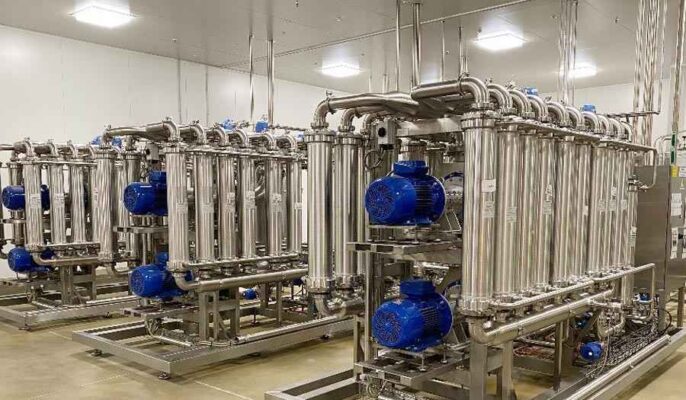Since beer is about 90% water, the quality and mineral content of the water will have a large impact on the flavor of the beer. Two important elements of water affect the taste of beer: mineral content and pH. The hardness and mineral content of the water infuse flavor and affect the fermentation process. The pH of the water is conducive to the rapid reproduction of yeast during the fermentation stage. Alkalinity creates buffers that protect the pH from fluctuations throughout the brewing process, ensuring bacteria cannot grow and removing excess tannins from the beer.
Commercial breweries need a way to ensure they produce consistent tasting, high-quality beer to be successful, which requires proper filtration of the large volumes of water they use.
Why water filtration is important for brewers?
Water is the main component of beer and one of the components that has the greatest impact on beer flavor. brewers used available water to brew beer, resulting in unique regional flavor profiles that exist across the globe.
Since ancient times, brewers have been experimenting and developing unique beer recipes. Through experimentation, they learned that the quality and composition of the water help develop the beer’s unique flavor. Water filtration systems like reverse osmosis give winemakers a solid starting point from which to express their creativity and make their recipes shine. Purified water ensures consistency from batch to batch and can mimic the water quality of famous beer-producing regions. Reverse osmosis water gives brewers extensive control over flavor and the ability to innovate.

Beer brewing process
Brewhouse, also known as the hot water steeping process, starts the brewing process and prepares the barley for fermentation. During mashing, the crushed grains are hydrated with filtered hot water, forming a thick mixture and activating enzymes in the malt. These enzymes convert soluble cereal starches into fermentable sugars. This sugary liquid is called wort, which is a combination of proteins and carbohydrates that affects the malt, mouthfeel, and body of the beer.
When the wort is ready to ferment, its moisture content is between 80-90%. Although the wort will extract flavor and aroma from the hops, it can only do so by boiling it in water and passing it through a wort cooler. Water is critical to the development of these flavor characteristics.
What minerals affect the taste of beer?
The minerals present in the brewing water will determine the flavor profile of the beer. Water hardness is a measurement of the total level of dissolved calcium and magnesium (TDS), which gives beer its intense hoppy flavor. If the water contains chloride, it will give the beer a rich taste. Sodium, sulfates, and carbonates all affect the flavor of fermentation. The presence (or absence) of each dissolved solid creates a unique flavor profile during the brewing process. But, they must be used with caution, as too much can result in an unpleasant and intolerable taste.
Mineral ions work with pH and alkalinity throughout the brewing process. Carbonates and bicarbonates stabilize the pH during mashing. If too much chloride is present in the brewing water, the fermentation process may be hindered because the chloride destroys the yeast.
Why use a water filtration system for beer brewing?
To ensure that the beer they produce has the flavor they want, breweries need water filtration systems designed and built for the water they use. Besides flavor consistency, there are other reasons why a brewery must have a custom filtration system. Consider the following:
Water hardness
The hardness of the water used to brew beer has a huge impact on the final product. water hardness is determined by the amount of minerals in the water, which cannot be removed by softening or boiling the water. These minerals can be broken down into calcium, sulfate, and magnesium.
Calcium
Calcium lowers the pH during glycation. It also improves the stability and clarity of the final product.

Sulfate
When there is too much sulfur in the water, an unpleasant smell can develop in the beer. It can also bring out the bitterness of the hops, making them appear drier and crisper.
Magnesium
Some magnesium is needed to help yeast grow, but too much may result in a bitter taste in the final product.
Sodium
A small amount of sodium won’t have a big impact on the flavor of your beer. But, if there is too much sodium, it can produce a metallic taste, which is why demineralized water is not suitable for beer brewing.
Chlorine
Chlorine is not a required chemical for brewing water. Often used to treat city water and sanitize brewing equipment, it can impact the flavor of the finished beer.
Sediment
No one wants to find sediment, sand, or other solids in their beer. These types of particles must be filtered out.
Different beers must different water
The hardness and chemical composition of the water play an important role in the style of beer brewed. For example, softer water (water that doesn’t have a high concentration of ions) is used to brew pilsner, while water with a higher calcium concentration (harder water) makes for a hoppier beer because the hops stick to it. Attached to calcium.
What is the best brewing water?
Since each type of beer requires different levels of hardness, bicarbonate, and sulfate, the best water for brewing beer is one that gives you complete control over the flavor profile. Water with high mineral and metal content can limit your range of beer styles.
Since each type of beer requires different levels of hardness, bicarbonate, and sulfate, the best water for brewing beer is one that gives you complete control over the flavor profile. Water with high mineral and metal content can limit your range of beer styles.
To determine the ionic composition of water in your area, you can request a water quality report from your city or test the water yourself. City water contains chlorine and chloramines, both of which can make your beer taste bad and disrupt the fermentation process. If the water is hard, you will be limited in the types of beers you can explore. Because when the calcium ion content exceeds 50 mg/L, beer cannot be brewed.
If you want to improve the flavor of your beer, then installing a water filtration system would be a wise choice. Not only does it improve the flavor of your beer, it also improves its consistency.
Types of water filters used in breweries
No matter what type of beer a commercial brewery produces, the water they use can determine the success or failure of their final product. Water used for brewing should be free of odors, chlorine, and other contaminants. Many brewers use water filtration systems to purify the water and then add any desired elements to enhance the quality of the water before starting the recipe.
Some filtration solutions used by winemakers include:
Particle filter
These filters are sheets or cartridges that capture larger particles while allowing the remaining water to flow through. This type of filtration removes solids, sediment, dirt, and other larger particles from the water.

Carbon filter
These filters can be used with particle filtration. Carbon filters effectively remove chlorine and other minerals from water. This type of filtration is essential for craft beer brewing. Most municipal water systems use chlorine to disinfect water.
Granular Activated Carbon (GAC) Filter
GAC filters effectively remove chlorine, chloramines, pesticides, odors and other contaminants from water.
Reverse osmosis filtration
Reverse osmosis (RO) is probably the most effective filtration method, but it can also be quite expensive. RO removes ions, molecules, and larger particles from water using a porous membrane that only allows water molecules to pass through.




